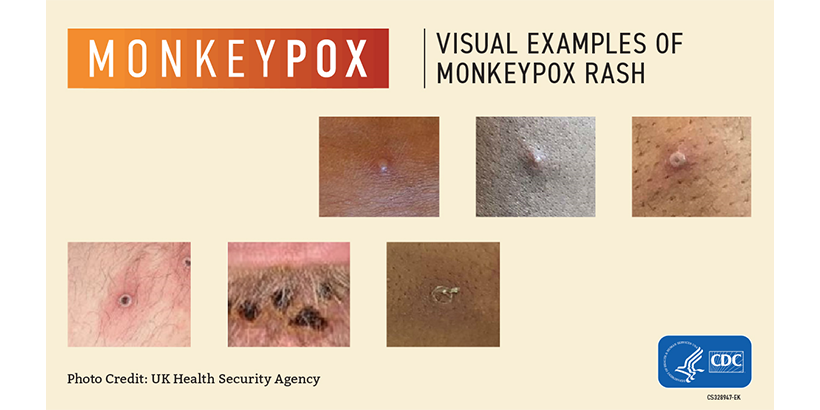Health Advisory: Monkeypox
Following the recommended prevention steps and getting vaccinated if you were exposed to monkeypox or are at higher risk of being exposed to monkeypox can help protect you and your community.
The Los Angeles County Department of Public Health is working with state and national partners on an international outbreak of monkeypox. Monkeypox is a rare disease that is caused by infection with the monkeypox virus. Monkeypox is of public health concern because the illness is similar to smallpox and can be spread from infected humans, animals, and materials contaminated with the virus. Monkeypox is less transmissible and usually less severe than smallpox. The risk of monkeypox in the general population remains very low. In the current outbreak, most cases have been among gay, bisexual, and other men who have sex with men or trans persons. However, anyone can get monkeypox if they are exposed. If you think you have had an exposure, have symptoms you are concerned about, or need to speak with someone about your risk, please speak with your primary care physician or contact the Student Health Center.
The Student Health Center is following guidance from the World Health Organization, the Centers for Disease Control and Prevention, and the Los Angeles County Department of Public Health. SHC clinicians are trained to identify monkeypox, and our office is procuring the necessary supplies for testing. Medical staff can complete risk assessments to help students assess their risk and, if appropriate, refer students for vaccination or post-exposure prophylaxis. At this time, monkeypox vaccination is not available at the SHC. Our office is working with Housing and Residence Life to make appropriate preparations for isolation space should a residential student contract monkeypox. The University recognizes some students may be experiencing ongoing feelings of uncertainty or anxiety. As a reminder, mental health resources are available through the Counseling Center.
Symptoms
Symptoms of monkeypox can include:
- Fever
- Headache
- Muscle aches and backache
- Swollen lymph nodes
- Chills
- Exhaustion
- Respiratory symptoms (e.g., sore throat, nasal congestion, or cough)
- A rash that may be located on or near the genitals (penis, testicles, labia, and vagina)
or anus (butthole) but could also be on other areas like the hands, feet, chest, face,
or mouth
- The rash will go through several stages, including scabs, before healing
- The rash can look like pimples or blisters and may be painful or itchy

You may experience all or only a few symptoms:
- Sometimes, people get a rash first, followed by other symptoms; others only experience a rash
- Most people with monkeypox will get a rash
- Some people have developed a rash before (or without) other symptoms
Monkeypox symptoms usually start within 3 weeks of exposure to the virus. If someone has flu-like symptoms, they will usually develop a rash 1-4 days later. Monkeypox can be spread from the time symptoms start until the rash has healed, all scabs have fallen off, and a fresh layer of skin has formed. The illness typically lasts 2-4 weeks.
Prevention
Take the following steps to prevent getting monkeypox:
- Avoid close, skin-to-skin contact with people who have a rash that looks like monkeypox
- Do not touch the rash or scabs of a person with monkeypox
- Do not kiss, hug, cuddle, or have sex with someone with monkeypox
- Avoid contact with objects and materials that a person with monkeypox has used
- Do not share eating utensils or cups with a person with monkeypox
- Do not handle or touch the bedding, towels, or clothing of a person with monkeypox
- Wash your hands often with soap and water or use an alcohol-based hand sanitizer, especially before eating or touching your face and after you use the bathroom
Vaccination
The Centers for Disease Control and Prevention recommends vaccination for people who have been exposed to monkeypox and people who may be more likely to get monkeypox. Currently, monkeypox vaccine supplies are very limited. Learn more about local vaccination clinics and eligibility requirements on the Los Angeles County Department of Public Health monkeypox webpage.